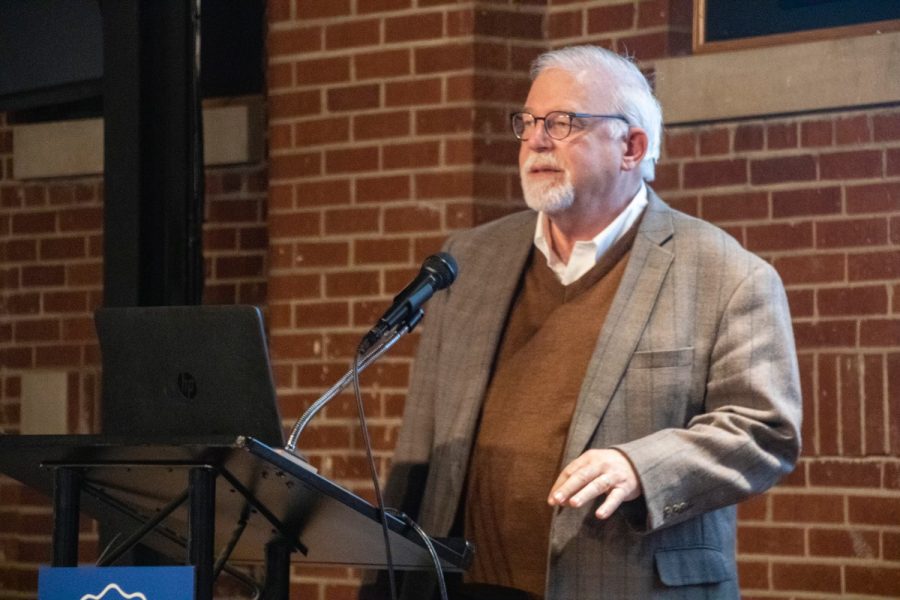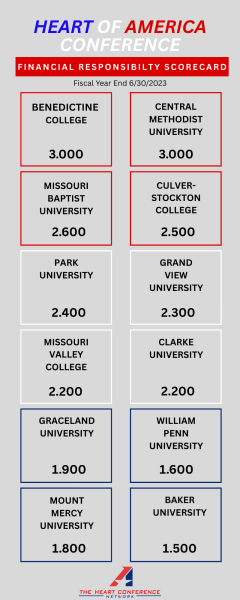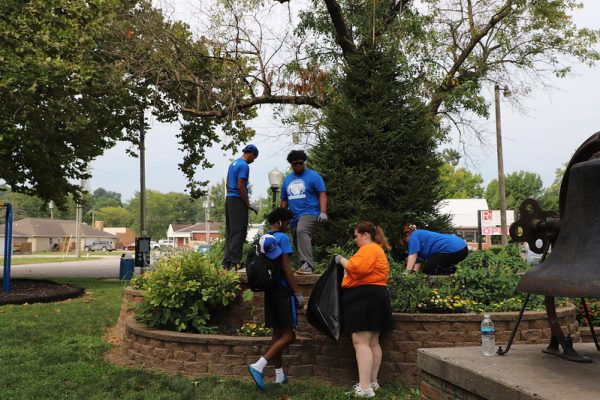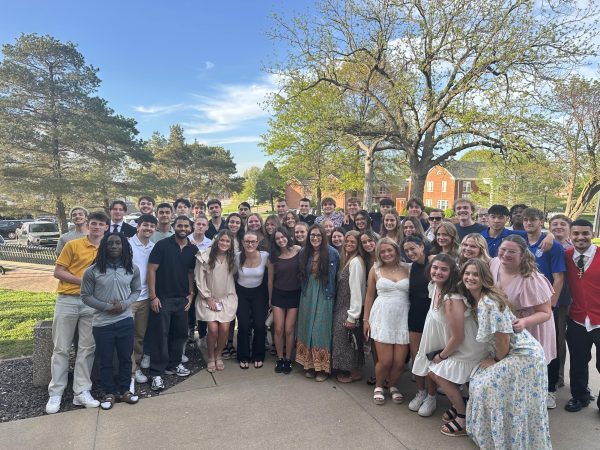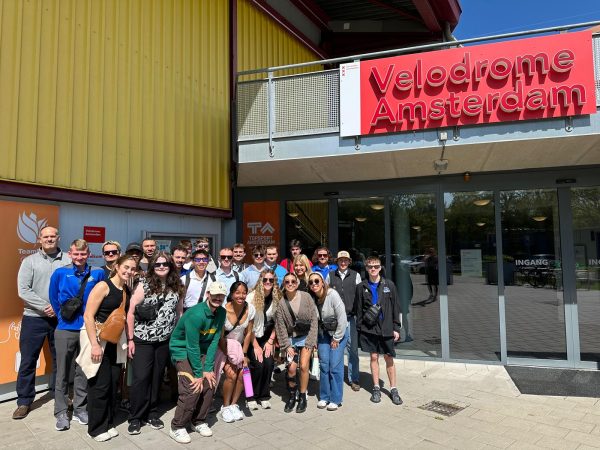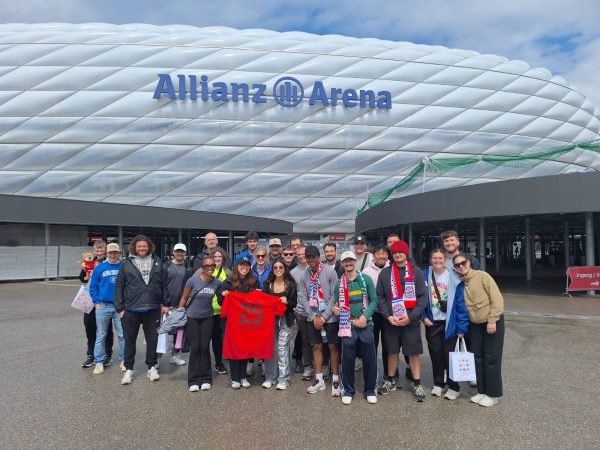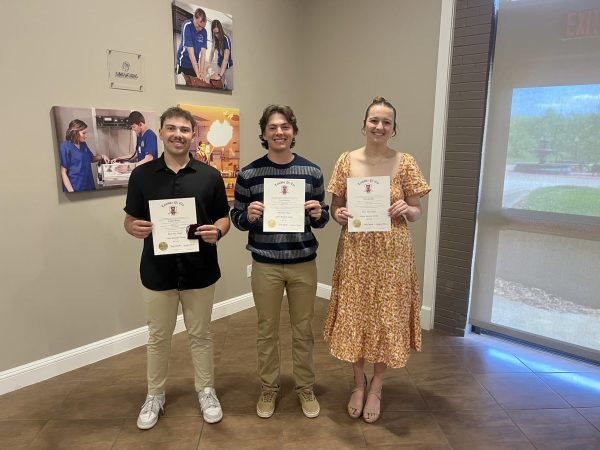Professors Say Ruso-Ukrainian War is Largest Conflict in Europe Since WWII: International Roundtable 3-2-22
On Wednesday, March 2, Drs. DeWaard and Hotle held another meeting in the International Series, highlighting the quickly-moving developments in Ukraine’s invasion, which had taken place around a week before the event.
The content of the panel was quite lengthy, and is divided into historical background, discussion of the invasion, and student questions below.
Historical Background
DeWaard opened the event with, “It’s incumbent to put together an update on this dynamic situation before spring break. It will get worse before it gets better.” He continued by noting after seven days of combat, the war has proven to be the largest conflict in Europe since WWII.
Continuing, DeWaard emphasized that the Ukraine crisis is a “pivotal moment in international relations”, and offered the framing of a historical parallel in the Munich Agreement of 1938, where European representatives led by British Prime Minister Neville Chamberlain agreed to a policy of appeasement, ceding the Sudetenland. Hotle expounded upon the parallel, explaining that Sudetenland was a majority German portion of the region of former Czechoslovakia now known as Czechia, home to much of the nation’s industry and fortifications.
While the agreement was set, it only took a matter of months for Hitler to seize control of the remainder of weakened Czechoslovakia. Prior to Ukraine’s invasion, it had been suspected that Russia would pursue a similar policy, as it had done in the Crimea, merely seizing the Donbas region and being appeased.
Like the Munich agreement, DeWaard stated, this crisis is an opportune moment for an ideological battle of free countries versus autocrats.
Hotle offered further parallels, such as the Spanish Civil War of 1936, where German-backed fascists led by Francisco Franco rose up in a coup against a left-wing government, split into factions of Marxist and Democratic-Republican ideology supported by Russia and the western allies respectively.
He additionally encouraged comparison and contrast with the Crimean war, a 19th-century conflict most famous for the Charge of the Light Brigade. A coalition including Britain, France, Italy, and Austria stepped in to defend the Ottoman Empire against Russian aggression, fighting in the very region Russia seized from Ukraine in 2014. Hotle stated that it led to a restructuring of Czarist Russia, much as it has been hoped that this war may lead to the deposition of President Vladimir Putin.
Offering further perspective, Hotle stated that the Russian government and people might see hypocrisy in the U.S. response to their invasion of Ukraine, comparing it to frequent interventions in Mexico and Central America, wherein the U.S. replaced economically or politically uncooperative governments with more friendly puppets, similar to President Lukashenko in Belarus.
Hotle stated another parallel could be found in the Cold War, a series of proxy conflicts and nuclear tension between the U.S. and Russia. In a period lasting from the end of WWII to the Soviet Union’s collapse in 1991, the U.S. and Russia competed for influence in states throughout the world, both NATO and Russia’s equivalent, the now-dissolved Warsaw Pact offering protection and funding on the condition of maintaining an ideologically aligned government.
Events such as the conflict in Ukraine or Russia’s crushing of popular revolt in Belarus and Kazakhstan seem to foretell a return to this model, with the two blocs this time representing the struggle between political systems of ostensible democracy and naked autocracy.
Concerningly, in recent years, both the U.S. and Russia have withdrawn from the careful, consistent web of nuclear arms treaties that limited development and helped to prevent an apocalyptic exchange of such weapons of mass destruction.
The Invasion
Over the last several months, 150,000 to 180,000 troops were amassed by Russia at its and Belarus’ borders with Ukraine, pouring across the border two weeks ago and attempting to encircle major urban areas like Kherson, a major port on the Black Sea, and Kyiv, the capital.
The prior week, the conflict in Ukraine was in a more grim situation with little support. However, Ukraine has had quite a turnaround, creating an impressive defense, the ferocity of which logistics from the Russian army gathered the world, save for Russia’s closest economic partners into efforts to support the nation of Ukraine.
Moreover, even fellow OPEC states such as Saudi Arabia and Dubai joined western nations in a UN General Assembly vote to condemn Russia’s illegal and aggressive invasion of Ukraine, with 141 in favor, 4 against, and 35 abstaining.
In the wake of the invasion, the west has leveled all types of sanctions on Russia, crippling its economy and threatening the stability of its regime. Many within Russia have been arrested for peaceful protest, with many high profile figures begging for an end to war in sharp contrast to a number of western pundits sympathetic to Russia’s cause, such as Tucker Carlson who have offered apologies for Russia and spouted Kremlin talking points verbatim.
Concerns of propaganda and misinformation have been quite prominent, with media crackdowns on both sides. Russia crafted a law against “untrue” coverage of what they deem to be a police action, shuttering a number of their already sparse independent media outlets. Western sanctions have forced TV and social media companies to remove Russian state media, leading to the closure and dismissal of Russia Today’s U.S. branch. China has notably taken a stance of enforced neutrality, refusing to call the invasion a war in line with Russia’s rhetoric, but not condemning Ukraine, censoring both pro-Russia and pro-Western arguments alike on its social media, similar to Russia’s suppression of anti-war voices and blocking of western social media.
Hotle stated that, if we see this fight continue, it’s hard to tell how long it will go on. It may turn into a protracted guerilla war, the overt conflict potentially lasting for weeks and months, to the great agony of the Ukrainian people.
DeWaard and Hotle stated that students can find the most accurate and up-to-date reporting on the conflict from the Associated Press, Reuters, and the BBC.
Our article on a previous roundtable offers much historical background. Additionally, this video offers a breakdown of Russia’s vulnerable position with a NATO-aligned Ukraine. It posits that Russia was threatened by multiple factors, such as Ukraine’s potential to become a rival “petrostate”, and replace it as Europe’s main supplier of fossil fuel. The video also includes information about water shortages Crimea has been experiencing since the blockage of a Ukrainian canal to the area in the wake of its annexation by Russia. This could lead the current conflict to be one of the first “water wars” of this century, an anticipated model of conflicts brought on by the world’s diminishing supply of drinkable water due to climate change.
Student Discussion
The professors invited student questions, which brought about discussion on a wide range of issues, from energy security to the deployment of Thermobaric missiles by Russia, an action thought to violate the Geneva conventions. Many headline issues were raised, such as the possibility of a no-fly zone, efforts for the International Criminal Court to bring war crimes charges to Russia, and the inevitable increase of gas prices surrounding the sanctioning of a nation that produces a tenth of the world’s fossil fuels.
The open discourse sparked policy debate on issues, such as the pro select of reopening pipeline projects like Keystone XL or offshore drilling, with positions presented by the professors and attending students touching on the plain economic concerns of high oil prices and the worry that reopening pipeline projects would lead to further imperialist attacks on the sovereign land of indigenous nations and suppression of peaceful protest in a grim mirror of the imperialist aggression against Ukraine.
Further issues, such as the decline of Russia’s currency, the Ruble were raised, with one student noting that the currency had dipped beneath the value of the video game Roblox’s ingame currency “Robux”. Other developments, such as Russia’s ejection from the SWIFT banking system, the consideration of traditionally neutral Sweden and Finland to NATO, and the petition of Ukraine for EU membership were also discussed.

